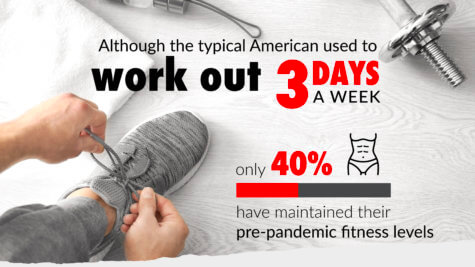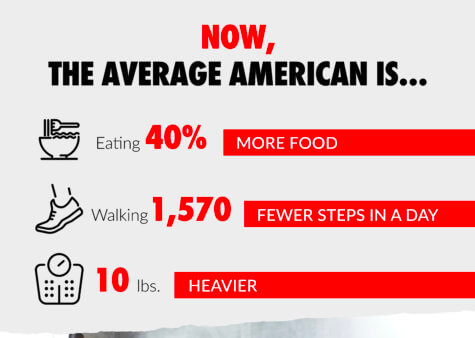NEW YORK — It’s not just the world that has come to a screeching halt during COVID-19, many people feel their own bodies are slowing down too. A new study finds nearly one in five people believe their metabolism has slowed during the pandemic. More than half believe the crisis has altered their metabolism for good.
That’s according to a recent survey of 2,000 people, asking the public to describe how living through COVID has physically affected not just their health but their relationship to their own bodies as well. Conducted by OnePoll on behalf of V Shred Fitness, the survey also suggests that this problem has a connection to how much the pandemic has disrupted their usual level of activity.
A year without exercise?
 Prior to 2020, the typical respondent worked out three days a week. The most common exercise tools included ellipticals and treadmills (49%) and weight machines (41%). Unfortunately, only 40 percent of those polled believe they’ve been able to maintain their pre-pandemic fitness levels. For example, respondents with step counters say they’re taking an average of 1,570 fewer steps each day.
Prior to 2020, the typical respondent worked out three days a week. The most common exercise tools included ellipticals and treadmills (49%) and weight machines (41%). Unfortunately, only 40 percent of those polled believe they’ve been able to maintain their pre-pandemic fitness levels. For example, respondents with step counters say they’re taking an average of 1,570 fewer steps each day.
Over one in four (28%) believe their weight has increased, including those with access to scales (29%). Those respondents report gaining an average of 10 pounds overall during the last year. Among those who monitor their resting heart rate, a third (35%) say it’s increased over 10 bpm on average. Some medical professionals worry that kind of increase can hurt overall cardiovascular health.
Of course, constantly staying indoors is impacting Americans’ diets too. Four in 10 are eating more food now than they did at the start of the pandemic. However, 45 percent believe the amount of exercise they do is what’s having the biggest negative impact on their metabolism. Lack of resources (36%), lack of support (35%), and their current diet (35%) all followed closely behind.
“No one has lived through anything like this before, so it’s good for us to remind ourselves that everyone, even our most elite scientists and doctors are still learning and understanding the human body,” says Vince Sant, spokesperson and co-founder of V Shred, in a statement. “The best thing we can do is focus on what we can control, which means that taking care of our own health is more important now than ever before.”
Metabolism boost needed pronto
When asked about post-pandemic life, 43 percent of respondents said they’re afraid that they’ll never feel like themselves again.
 Four in 10 now frequently experience feelings of detachment or disconnection from their physical bodies. For example, researchers find some no longer have a strong sense of how tall they are or how much space they take up. Another 39 percent worry they’ll overexert or hurt themselves more easily when they do return to working out. Even worse, 27 percent worry that they’ve lost the motivation to stay active altogether.
Four in 10 now frequently experience feelings of detachment or disconnection from their physical bodies. For example, researchers find some no longer have a strong sense of how tall they are or how much space they take up. Another 39 percent worry they’ll overexert or hurt themselves more easily when they do return to working out. Even worse, 27 percent worry that they’ve lost the motivation to stay active altogether.
“Because we live in a world of all-or-nothing extremes, a lot of people think they need to be perfect, working out 2 hours a day, giving up all the foods they like and eating nothing but grilled chicken, broccoli and rice in order to be healthy,” Sant adds. “But for most people, including me, that’s not sustainable.”
“People need to learn that health is really about consistency,” the V Shred co-founder continues. “It’s more important to follow diet plans that focus on eating healthy the majority of the time rather than ALL the time — to add foods that speed up metabolism and be diligent with exercise, but also take time to rest and recover.”
While many don’t feel like themselves at the moment, they’re also less concerned with what others think. In fact, only 15 percent are afraid that of being judged for how their bodies have changed during COVID. This isn’t to say that self-improvement is a thing of the past. Given the choice, 29 percent of respondents still say they’d rather have a better body over a better love life (28%), a better salary (24%), or a better work/life balance (12%).
